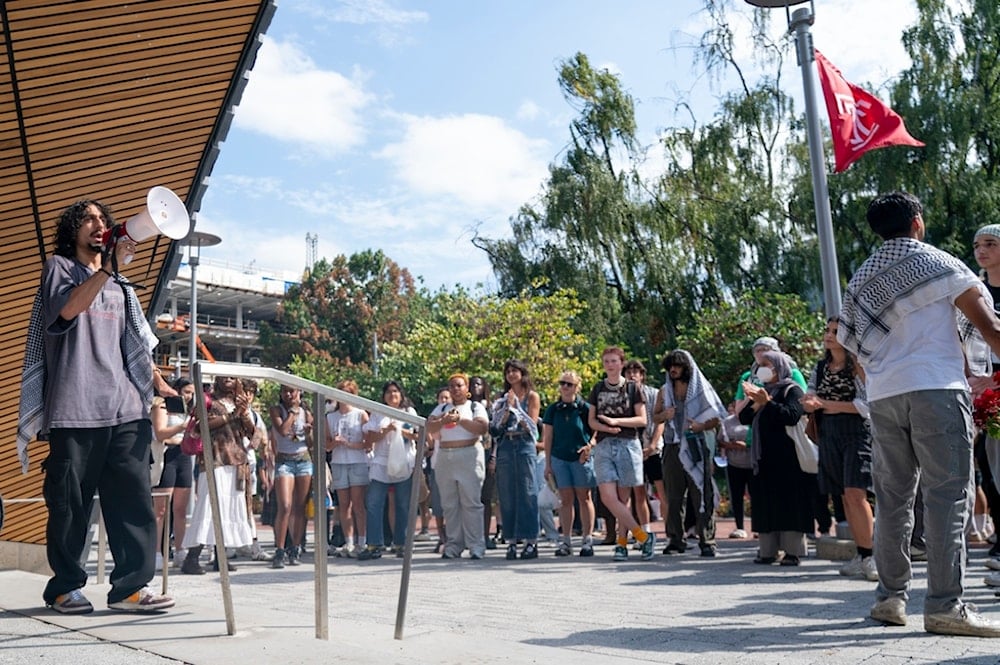US universities, trying to stifle students, change rules on protesting
Universities and colleges in the United States are attempting to stifle students protests by changing regulations on on-campus demonstrations.
-

People participate in a pro-Palestine rally and march on Temple University campus in Philadelphia, on August 29, 2024. (AP)
Universities across the United States are implementing stricter regulations on campus protests and free speech following widespread demonstrations during the spring semester over the ongoing support for the Israeli genocide in Gaza, The New York Times reported.
The new rules in question vary between institutions but generally limit the timing, location, and nature of protests, with some specifically banning the highly effective encampments and restricting areas for demonstrations.
For example, students at Case Western Reserve University are now required to obtain administrative approval before holding protests. Similarly, Rutgers University mandates a permit for student protests.
Temporal, spatial bans
The Indiana University, meanwhile, has imposed a ban on "expressive activity" between 11 pm and 6 am.
Universities claim these measures are aimed at preventing disruptions and clarifying existing policies, though many critics have made it clear that they are intended to stifle the voices of student activists, The New York Times said.
Many schools, just like Indiana, have introduced policies that limit protests to specific hours and restrict certain locations. At Ohio State University, for instance, all campus events must conclude by 10 pm, while Northwestern University has prohibited protests before 3 pm in areas surrounded by classrooms.
Rutgers has confined demonstrations to between 9 am and 4 pm, and Franklin & Marshall College has implemented a two-hour limit on rallies and vigils.
In response to these restrictions, students and faculty at Indiana University have held vigils that intentionally violate the new rules. At least nine participants, including Professor Ben Robinson, who had previously been arrested during a pro-Palestinian protest in the spring, now face disciplinary action.
The American Civil Liberties Union of Indiana has filed a lawsuit against the university, arguing that the time restrictions limit fundamental free speech. However, Indiana University has defended the policy, asserting that it continues to "encourage freedom of expression for all."
Encampment ban
As reported by the NYT, encampments, which were prominent and proved to be one of the most effective forms of protest, have been explicitly banned on several campuses. While many universities already prohibited camping on school grounds, institutions such as Emory University, Rutgers, and the University of California system have strengthened or introduced these bans.
The University of California, Los Angeles, for instance, enacted a ban after a violent incident where Zionist counterprotesters attacked a pro-Palestinian encampment.
The University of Virginia, where police used chemical agents to break up a protest encampment last semester, also adopted a new camping ban. Brian Coy, a spokesperson for the university, stated, "The University of Virginia is an institution of higher education, not a campground."
Freedom of speech?
New York University, in a further crackdown, updated its conduct guidelines to clarify that targeting "Zionists" or "Zionism" could violate its nondiscrimination policy, invoking "anti-semitism".
NYU's policy now warns that using the term "Zionist" in certain contexts or excluding individuals based on their support for Zionism could lead to disciplinary action.
Universities across the United States witnessed a historic surge in student protests in support of Palestine and Gaza, calling for ending all agreements with "Israel" and divesting from the occupation entity. Students also demanded an end to the US support to "Israel" and involvement in the genocidal war.
Students for Gaza SFSU announced during a press conference and rally on the campus Malcolm X Plaza that the institution will divest its corporate bonds holdings from American aerospace and arms company Lockheed Martin Corporation, Italian defense firm Leonardo, US-based data analytics company Palantir Technologies, and construction equipment manufacturer Caterpillar.
These corporations have been described as "profiting from the Gaza genocide" by the American Friends Service Committee (AFSC).

 4 Min Read
4 Min Read








